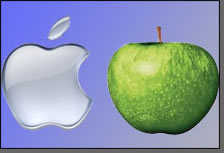|
|||
British Court Hears Apple v. Apple and 'Le Freak' |
|||
LONDON, March 29 — The High Court of Britain, accustomed to the sounds of bewigged barristers parsing the fine points of the law, was treated Wednesday to a funky playback of the disco anthem "Le Freak" as a lawyer for the Beatles' record company argued that Apple Computer's iTunes digital music store violated a trademark agreement between the companies. In a clash of cultural icons, the Beatles' record company, Apple Corps, wants Apple Computer to stop using its familiar logo, in the shape of an apple with a bite out of it, on the iTunes Music Store. Apple Corps contends that the use of the logo infringes on a 1991 agreement, which it says barred Apple Computer from using the logo in connection with the sale of music. The trial — which opened in a courtroom wired to the Internet and brimming with video screens, laptops and iPods but devoid of wigs, robes or Apple's chief executive, Steven P. Jobs — is the latest in a series of disputes between Apple Computer and Apple Corps. But it is the first case between the companies in the era of digital downloading. That technology, which did not exist in 1991, now accounts for more than 6 percent of music sales, the industry says. For Apple Computer, whose iPod music player has been a huge success, the London trial is only one of its European headaches. French lawmakers, for example, gave preliminary support this month to a measure that would require the company to open the iPod to play music purchased from other online music services. In the London trial, which is likely to run into next week or perhaps even longer, Apple Computer is expected to argue that it merely serves as a conduit for the transmission of music in digital form. A lawyer for Apple Computer, Anthony Grabiner, declined to comment outside the courtroom, citing legal restrictions. In his opening argument, Geoffrey Vos, a lawyer representing Apple Corps, dismissed the conduit argument, contending that the lack of "interoperability" with other companies' music stores undermined Apple Computer's stance. He noted that iTunes offers exclusive songs not available in CD form, as well as repackaged collections, products that he said demonstrated that Apple Computer was a music seller, not simply a transmitter of other companies' music. The holder of the copyright on the music is not immediately obvious on iTunes, he added. "The agreement was intended to say, We do music, you do computer software delivery systems," Mr. Vos said of the 1991 deal. "The moment you cross the line is when you say you're in the record business." The opening day of the trial was filled with light moments, as when Mr. Vos demonstrated the workings of iTunes for Justice Edward Mann, who took notes on a Dell laptop. Mr. Vos downloaded a copy of "Le Freak," a 1970's hit from Chic, and proceeded to play it for the court. A ruling from Justice Mann is not expected for some time. Mr. Vos also showed a television commercial for iTunes, featuring the British band Coldplay performing "Speed of Sound." The ad features the Apple Computer logo alongside a reference to "iTunes.com," and promotes a Coldplay album. "We know what they're selling with that," Mr. Vos said. One band that Mr. Vos was unable to highlight on iTunes was the Beatles themselves. Apple Corps — which is owned by Ringo Starr; Paul McCartney; John Lennon's widow, Yoko Ono; and the estate of George Harrison — has so far refused to license the Beatles' music catalog for digital sales. That makes it one of only a handful of bands still unavailable via legitimate online music sites. Mr. Vos said Neil Aspinall, managing director of Apple Corps, had rejected an offer from Mr. Jobs in 2003 proposing to buy the rights to the Apple Records name for $1 million. The iTunes Music Store appears with the Apple Computer logo, but not the company's name. In the suit, Apple Corps is seeking an injunction requiring Apple Computer to remove the bitten-apple logo from iTunes. If it succeeds, said Nick Valner, a lawyer representing Apple Corps, the company would seek undisclosed monetary damages. Without the logo, Mr. Vos said, "iTunes is a jolly good name." By ERIC PFANNER |
|||
 NY TIMES
NY TIMES